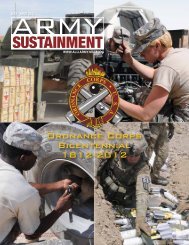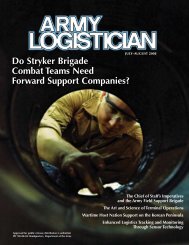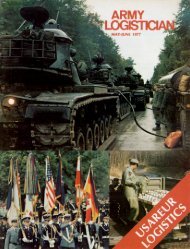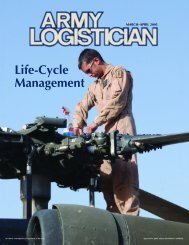Medical Logistics - Army Logistics University - U.S. Army
Medical Logistics - Army Logistics University - U.S. Army
Medical Logistics - Army Logistics University - U.S. Army
Create successful ePaper yourself
Turn your PDF publications into a flip-book with our unique Google optimized e-Paper software.
The Nature of Knowledge in the Profession<br />
of Military <strong>Logistics</strong><br />
Last year I participated in a professional forum in<br />
which educators and practitioners came together to<br />
discuss how best to educate and develop Department<br />
of Defense (DOD) logisticians, be they military or<br />
civilian. The dominant theory of effectiveness seemed to<br />
be centered on the concept of “competency mapping,”<br />
where standardized abilities are superimposed on a hierarchy<br />
of professional growth and competencies become<br />
more sophisticated as one moves up the chain. On the<br />
surface, this seems a logical proposition that would<br />
drive DOD and civilian colleges to develop programs<br />
that would meet the needs (expressed in measurable<br />
competencies) of the field. Rather than critiquing the<br />
overall idea of competency mapping (my colleagues and<br />
I already published an extensive critique in the autumn<br />
2004 issue of Parameters), I want to examine the idea<br />
from a philosophical perspective.<br />
Professor Don M. Snider of the United States<br />
Military Academy has written extensively on how to<br />
analyze the military as a profession. His descriptive<br />
model of expert knowledge asserts that professions<br />
generate abstract knowledge that is applied to new<br />
situations and that the application of this knowledge<br />
is ultimately judged by the profession’s clientele.<br />
However, missing from his model has been a discussion<br />
of the philosophical nature of that knowledge,<br />
namely an absence of ontological and epistemological<br />
considerations.<br />
Ontology is the study of being or existence (explanations<br />
of being a being) that one can interpret as the<br />
“objective-subjective” continuum. Aspects of knowledge<br />
of being fall somewhere on the line between that<br />
which is concrete (witnessed “objectively” by our five<br />
senses) and that which is conceptually created (things<br />
that we have “subjectively” constructed in abstract<br />
ways to make sense of the world). For example, while<br />
a manual requisition exists objectively as a piece<br />
of paper, it also exists through subjective meaning<br />
because we agree in our professional community that<br />
it is a request for delivery of supplies.<br />
Epistemology (explanations of the origins of<br />
knowledge) involves examining the assumptions of<br />
generating knowledge that one construes along the<br />
ARMY LOGISTICIAN PROFESSIONAL BULLETIN OF UNITED STATES ARMY LOGISTICS<br />
by Dr. Christopher r. paparone<br />
How does the Department of Defense best educate and develop its logisticians?<br />
The author looks at how to frame military logistics knowledge holistically.<br />
“simple-complex” continuum. For example, is knowledge<br />
best formed by breaking aspects of military<br />
logistics down into manageable pieces (the object of<br />
analysis) or by taking holistic approaches to appreciate<br />
the complexity of the entire logistics system (the object<br />
of synthesis)?<br />
Rather than choosing which philosophical views are<br />
more advantageous for the professional knowledge of<br />
military logistics, my intent is to unify these otherwise<br />
competing philosophies—that is, to provide a macrophilosophy<br />
of knowledge that I believe will serve the<br />
profession well. This integrated view is formed by<br />
crossing the ontological continuum with the epistemological<br />
continuum. (See the chart on page 40.)<br />
The resulting four ideal types of military logistics<br />
knowledge help us to see educational and developmental<br />
issues in a more holistic way. Let us now examine<br />
each ideal type separately—temporarily suspending the<br />
interconnectedness of the whole—before returning to<br />
discussion of the synthetic view.<br />
<strong>Logistics</strong> Science<br />
The lower-left quadrant of the chart depicts military<br />
logistics as a management science. As the scientific<br />
method demands, conducting logistics as a management<br />
science involves knowledge associated with<br />
breaking logistics problems down into simpler chunks<br />
that can be addressed with technically rational decisionmaking<br />
processes (such as isolating and defining<br />
the problem, developing alternatives, comparing them<br />
to “objective” criteria, and then selecting the best alternative).<br />
For example, the systems engineering science<br />
associated with developing the Standard <strong>Army</strong> Retail<br />
Supply System would create this sort of knowledge.<br />
Knowledge based on the scientific method is<br />
very attractive to educators and budget programmers<br />
because curricula and programs can be rationalized<br />
with high degrees of precision and justified using preengineered<br />
“best” practices, even those borrowed from<br />
private organizations. This form of knowledge should<br />
be most familiar to institutions that train or educate for<br />
certainty (teaching facts rather than encouraging critical<br />
reasoning), where high reliability can be designed<br />
39







